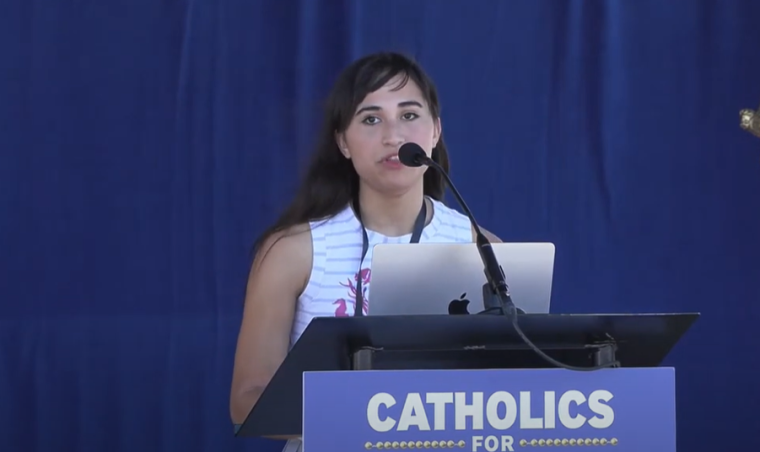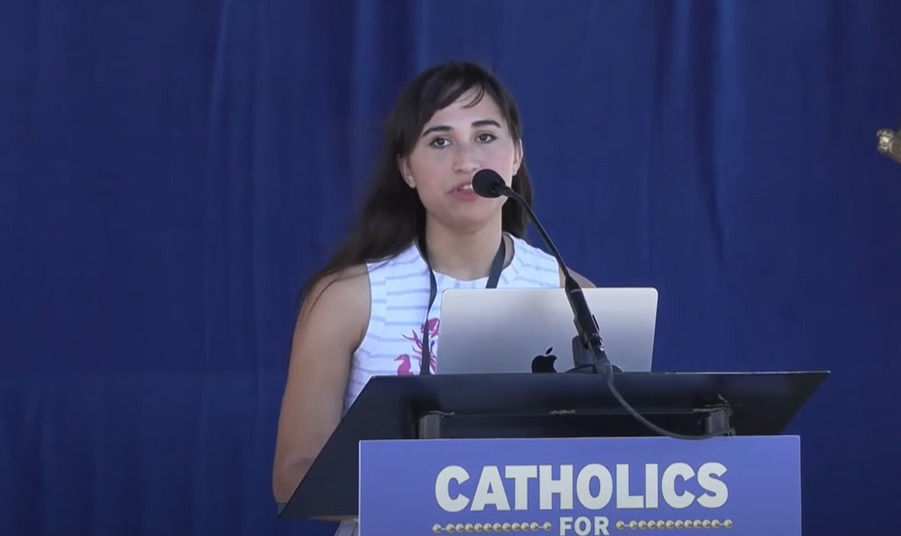
Prominent activists are urging Ohio voters to support a measure that would require constitutional amendments to pass with support from 60% of eligible voters, warning that parental rights and the safety of minors hang in the balance as voters are also scheduled to weigh in on a ballot measure that would establish a right to abortion in the state.
The advocacy group Catholics for Catholics held a Prayer Rally to Save Ohio’s Children in Norwood, Ohio, Sunday. The event took place two days before Ohioans are scheduled to go to the polls to vote on the fate of Issue 1, a referendum that would require proposed constitutional amendments to secure 60% support from voters to take effect instead of a simple majority.
The purpose of the rally was to encourage Ohioans to Vote “Yes” on Issue 1.
As explained by Catholics for Catholics, “Issue 1 is part of a fight culminating this November over a ballot measure that would enshrine abortion in the Ohio Constitution and limit parents’ legal right to consent to what procedures are done to their children.”
The group, which exists to “hold our elected leaders accountable to the Constitution and, in a special way, to those politicians who refer to themselves as Catholic,” maintains that “Voting YES will protect Ohio’s Constitution and save children from abortion up to birth and genital mutilation without parental consent.”
A “yes” vote on Issue 1 would require constitutional amendments that appear on the ballot to receive the support of 60% of voters.
A separate abortion-related ballot measure slated to go before voters in November would amend the Ohio Constitution and states: “Every individual has a right to make and carry out one’s reproductive decisions, including but not limited to decisions on contraception, fertility treatment, continuing one’s own pregnancy, miscarriage care, and abortion.”
Additionally, the amendment would declare that “the State shall not, directly or indirectly, burden, penalize, prohibit, interfere with, or discriminate against either an individual’s voluntary exercise of this right or a person or entity that assists an individual exercising this right, unless the State demonstrates that it is using the least restrictive means to advance the individual’s health in accordance with widely accepted and evidence-based standards of care.”
While the text of the measure stresses that the state may prohibit abortion after “fetal viability,” it states that “in no case may such an abortion be prohibited if in the professional judgment of the pregnant patient’s treating physician it is necessary to protect the patient’s life or health.”
The event featured several notable speakers, including pro-life activist and edifi podcast host Abby Johnson and detransitioner Chloe Cole, who is suing the medical providers who prescribed her testosterone and performed an irreversible double mastectomy on her as a minor.
Johnson warned that “what’s happening in many states” could come to Ohio if Issue 1 fails to pass and the abortion referendum in November is able to “skim by a small margin.”
Specifically, she talked about how, in other states, school officials will take young pregnant girls to abortion clinics during the school day without parental consent. “Their parents have no idea the girl’s pregnant,” she explained.
In a separate issue concerning consent, Cole added that several states have passed measures banning sex-change procedures for minors in state legislative sessions before warning that the failure to pass Issue 1 might result in the erosion of “the victories that we have achieved.” She called on attendees to “let this state be an example for Illinois, Wisconsin, Michigan, Minnesota and the rest of the country that is so grappled by the pseudo-science” behind the push to provide children with irreversible gender transitions.
“Children are relying on us, as parents, older brothers and sisters, educators, doctors, as adults to guide them towards a healthy adulthood filled with opportunity,” she added. “I hear a lot of talk in this state about Issue 1 and reproductive freedom but that seems to end when we start talking about the fact that children are having their right to reproduce taken away from them with sterilizing drugs that are used to convert healthy girls and boys into just a mimicry of the opposite sex. Where are their reproductive rights?”
Cole lamented that “mine (reproductive rights) were lost when I was 13.” She insisted that “you and I are the only thing standing in between this attack on children,” adding, “You have a duty to finish this fight with me” by supporting Issue 1.
Two public opinion polls conducted ahead of Tuesday’s referendum have yielded conflicting results.
A poll of 500 likely voters conducted by USA Today and Suffolk University from July 9-12 showed that 57% of Ohioans opposed Issue 1, while 26% supported it. On the other hand, a poll of 675 likely voters conducted by Ohio Northern University from July 17-26 shows that 42% of Ohioans would vote in favor of Issue 1, while 41% would oppose it.
The USA Today/Suffolk poll measured support for the November ballot initiative at 59%, with 35% opposing it. When the Baldwin Wallace University Community Research Institute asked 586 registered Ohio voters between Sept. 30 and Oct. 3, 2022, if they would support a ballot measure to establish a right to abortion, 59.1% answered in the affirmative, while 26.7% indicated that they would oppose it. In both polls, support for establishing a right to abortion fell short of the 60% threshold it would need to pass if Issue 1 is approved.
Following the United States Supreme Court’s June 2022 Dobbs v. Jackson Women’s Health Organization decision determining that the U.S. Constitution did not contain a right to abortion, several states have taken action to enshrine a right to abortion into their state constitutions. Voters in the overwhelmingly Democratic states of California and Vermont approved constitutional amendments establishing a right to abortion by margins of nearly 34 and 54 percentage points, respectively.
Nearly 57% of voters in Michigan, a swing state where Democrats performed especially well in last year’s midterm elections, approved the establishment of a constitutional right to abortion, while 43.3% opposed it.
If passed, the ballot measure that will appear before voters in November would abolish pro-life protections for the unborn in Ohio. The state has passed a law banning abortion after six weeks gestation, which is on hold as it finds itself subject to litigation.
Ryan Foley is a reporter for The Christian Post. He can be reached at: ryan.foley@christianpost.com
Free Religious Freedom Updates
Join thousands of others to get the FREEDOM POST newsletter for free, sent twice a week from The Christian Post.




























![[Video] More – Aghogho » GospelHotspot](https://gospelhotspot.net/wp-content/uploads/2024/04/More-Aghogho.jpeg)
















